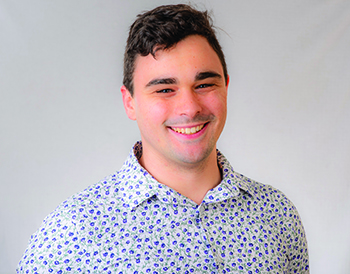 “As a young gay man myself, I feel like it’s my responsibility to help other HIV-negative gay men stay negative and help gay men living with HIV to live the longest and healthiest lives they can and I firmly believe that we cannot end the HIV epidemic in the United States without ending it for those who are most vulnerable,” says Goedel.
“As a young gay man myself, I feel like it’s my responsibility to help other HIV-negative gay men stay negative and help gay men living with HIV to live the longest and healthiest lives they can and I firmly believe that we cannot end the HIV epidemic in the United States without ending it for those who are most vulnerable,” says Goedel.
Goedel is a recipient of the Ruth L. Kirschstein National Research Service Award from the National Institute of Mental Health to support his dissertation work. “The award meant that I could have some protected time each week to do work that’s meaningful to me. It’s also my first grant award from the NIH so I’m quite proud of that,” he says.
Goedel’s dissertation is titled, From Surviving a Plague to Ending the Epidemic: Using Biomedical HIV Prevention to Reduce Disparities Among Gay and Bisexual Men. His research uses mathematical modeling to understand how to best implement HIV prevention strategies. He focuses on a variety of different prevention methods, such as a daily pill and a hypothetical vaccine. Goedel is especially interested in new prevention technologies and he is driven to help achieve health equity for all gay men. He enjoys working through the challenge of communicating with patients and healthcare providers about treatments that are in development.
Goedel explains, currently, gay and bisexual men in the United States have a one in six risk of acquiring HIV infection in their lifetimes, but there are stark disparities by race and ethnicity. This lifetime risk is one in two for Black/African-American men and one in five for Hispanic/Latino men, but only one in 11 for White men.
“We have numerous tools for preventing HIV transmission, including pre-exposure prophylaxis (PrEP), a pill that, when taken daily, reduces the risk of HIV infection by more than 99 percent,” says Goedel. He explains that not everyone likes taking pills, so he is also studying new HIV prevention technologies that are being developed and tested, such as long-acting injections and implants and HIV vaccines, and how those might help reach the goal of ending the HIV epidemic in the United States by 2030.
Goedel came to Brown to work with Associate Professor of Epidemiology, Brandon Marshall. With Marshall as his advisor, Goedel was part of a research team to discover that cold weather snaps are often followed by a notable increase in fatal opioid overdoses and to examine what interventions may work. Goedel presented his research idea in a departmental seminar which resulted in a collaboration with a faculty member and post-doctoral fellow in epidemiology.
Goedel explained in an article last summer that one potential cause is that opioid use and exposure to cold weather could combine to create a negative biological effect due to a reduced ability to breathe caused both by the opioid and cold air. The study findings were published in the journal Epidemiology and Goedel continues to do research in opioids and overdose as part of Marshall’s team, in addition to his HIV prevention research.
Goedel plans to complete his PhD and graduate in May of this year. He looks forward to developing a career as an academia. He has a long-term goal of one day blending teaching and research as a faculty member at a school of public health.